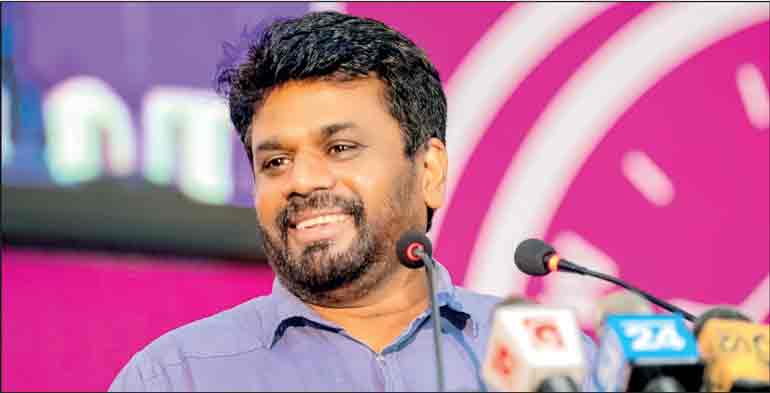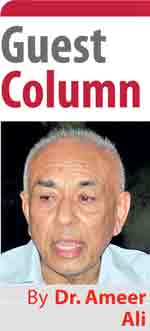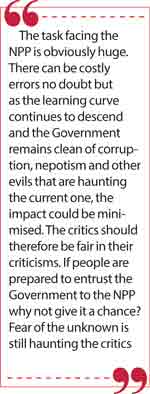Sunday Feb 15, 2026
Sunday Feb 15, 2026
Saturday, 17 February 2024 00:20 - - {{hitsCtrl.values.hits}}

 With increasing grassroot support for NPP and its leader Anura Kumara Dissanayake (AKD) those two have become enemy No. 1 to champions of and campaigners for the corrupt system that is currently in vogue. All signs point towards a national mood for radical change led by AKD and his NPP. It is in that context that the recent visit to Delhi by AKD at the invitation of India is significant.
With increasing grassroot support for NPP and its leader Anura Kumara Dissanayake (AKD) those two have become enemy No. 1 to champions of and campaigners for the corrupt system that is currently in vogue. All signs point towards a national mood for radical change led by AKD and his NPP. It is in that context that the recent visit to Delhi by AKD at the invitation of India is significant.
He spent a few hours discussing in English with the Indian External Affairs Minister S. Jaishankar and India’s National Security Adviser Ajit Doval. This invitation would not have been issued without advice from India’s Research and Analysis Wing (RAW) in Colombo. RAW must have been closely watching and doing its own home work about the rapidly changing political scenario to convince itself of the winning chances to AKD at the next Presidential election. Hence their message to Delhi and the invitation followed.
The visit also shows that JVP has matured to realise that there are no eternal friends or enemies in politics, but only interests. When interests coincide, relationships grow and decline when they clash. Yet, nothing is certain in politics and surprises are not uncommon. With that caveat let us look at the fairness or otherwise of some of the criticisms levelled against NPP and its leader by the opponents.
To start with, NPP’s opposition in general is a collective of geriatric leaders, conservative intellectuals and ethnonationalist demagogues who live in and cherish the past, which rewarded them handsomely and are afraid of losing their power and influence to a new system or paradigm as echoed by the aragalaya. The avant-garde of this new system is a new generation of political leaders and their organisations coalesced to gather under the NPP umbrella to be led by AKD.
These men and women of a younger generation are not only fully informed of the travails and tribulation of previous models of radical paradigms, which collapsed like a pack of cards when the first crack appeared on their fortresses in late 1970s, but are also intellectually equipped and politically skilled to lead this country into a new era of democracy while remaining as a dependable member with its indigenous trademark in a global milieu dominated by the neo-liberal paradigm. That much is clear when one hears from AKD his call for a “social revolution” to create a “new political culture” with “accountable democracy” and a “market friendly” economy.
Where in these themes one may question the critics are the sediments of an insurrectionary JVP of the bygone era? If not, why do the critics keep on reminding the people of that bloody past? Revolution yes, but violence no has underlined NPP’s socio-economic and political mission. AKD’s political battle for a ballot driven revolution continues to be a polished campaign against a moribund model of governance, economy and society structured on an ethnonationalist majoritarian ideology, which over the last seven decades and more had kept the country divided with violence, riots and a civil war, allowed politicians in power to amass private wealth at public expense without accountability, left the onus of settling the financial debt incurred by those rulers to future generations, and mortgaged the country’s sovereignty to rivalling regional and global powers in the name of development. In short, NPP’s crusade is against a system that deserves no more fine tuning or smoothening but total removal. That is what system change or paradigm shift means as demanded by the aragalaya.
However, a more reasonable criticism against the NPP is regarding its economic policy. Even here the critics are rushing to conclusion and accuse NPP of going back to the failed state-run economic models of past decades. This is not true, but neither does it mean a license to a market economy without checks and balances.
 NPP’s market friendliness would therefore begin with an unfriendly task of cleaning up rigidities, most of which are artificially created and tolerated by the state in the name of openness and in the interest for private profit. For example, there is no free competition in the rice industry and both producers and consumers of rice are at the mercy of a rice mafia in which a former president’s family is said to be associated with. The recent scandal over sugar under Gotabaya’s presidency is another example demonstrating how markets are cornered with blessings of the State. These have to be cleaned up for a healthy market to function.
NPP’s market friendliness would therefore begin with an unfriendly task of cleaning up rigidities, most of which are artificially created and tolerated by the state in the name of openness and in the interest for private profit. For example, there is no free competition in the rice industry and both producers and consumers of rice are at the mercy of a rice mafia in which a former president’s family is said to be associated with. The recent scandal over sugar under Gotabaya’s presidency is another example demonstrating how markets are cornered with blessings of the State. These have to be cleaned up for a healthy market to function.
However, a more serious question the critics raise is about NPP’s approach towards the IMF agenda for economic recovery. It is not enough to say, like every other party in the opposition, that NPP also would work with the IMF but would renegotiate over some of the IMF’s recommendations.
According to critics, once the agreement is signed there is no way of turning back. Is that true given the geopolitics in the region and Sri Lanka’s strategic location? Sri Lanka needs IMF as much as IMF’s shareholders need Sri Lanka. It appears from the speeches and media interviews of AKD and NPP hierarchy that there is a fundamental difference between them and IMF regarding the approach towards tackling the problem of economic recovery. The IMF believes that recovery and growth should be led by a partnership between the local and foreign wealthy and entrepreneurial classes in a free enterprise market model.
The IMF was created in the first place to be a guardian of free enterprise economies and the capitalist system. Therefore, its policies are obviously class biased and pro capital. According to that philosophy the wealthy are the geese that lay golden eggs, and that class should be protected from unnecessary taxes and levies imposed by the state. Ranil Wickremesinghe’s two Budgets and the latest increase in VAT reflect that philosophy and
class bias.
An IMF mission of experts is expected to arrive soon in Colombo to discuss the mechanism to introduce a reasonable property tax. Why not a progressive wealth tax instead, which would be more inclusive and therefore bring in more revenue? IMF believes that the investment of the rich and entrepreneurial is the ultimate tool for economic growth and prosperity. The late John Kenneth Galbraith, a renowned economist, cynically compared this approach to feeding a horse with oats for something to drop from its hind for sparrows to eat. Why not feed the sparrows directly?
AKD and NPP would obviously have problems with that approach in the context of Sri Lanka where the real economic sector is dominated by small and medium size enterprises (SMEs). Therefore, the tax structure should be more generous towards SMEs than to the mega companies and the wealthy. Is that not a reasonable policy? The SME sector needs revitalisation via a reverse flow of resources from the financial sector. It is a global phenomenon that the financial sector has been the real beneficiary of economic growth on one hand and producer of economic crises on the other.
Financialisation of economies is more a curse than blessing to world economies and particularly to the poorer ones. Financial speculators had ruined many economies. For example, in one single year 1997-98 Malaysia lost decades of growth because of speculation on Malaysian currency, which triggered what came to be known as the Asian meltdown. Dr. Mahathir blamed George Soros at that time for the crisis but withdrew his accusation when the two met later and Soros blamed the others for it. Or for that matter who would forget the impact of the 2008 financial crisis triggered by the housing market in the US? Or those of 2015, 2016, 2017 and 2022?
IMF’s priorities for stabilising Sri Lanka’s financial sector and expecting growth to stem from that stabilisation is obviously shortsighted and doesn’t promise a permanent solution to Sri Lanka’s economic crisis. The NPP’s renegotiation with the IMF would therefore be constrained by that party’s commitment to system change. IMF’s shareholders would understand the position better than local critics of NPP.
There are also other issues such as foreign debt restructuring, free trade agreements, and reforming state-owned enterprises. In all this NPP would not and cannot behave like a bull in China shop. It has its own team of economic and financial experts to tackle these issues. Yet, the task facing the NPP is obviously huge. There can be costly errors no doubt but as the learning curve continues to descend and the Government remains clean of corruption, nepotism and other evils that are haunting the current one, the impact could be minimised. The critics should therefore be fair in their criticisms. If people are prepared to entrust the Government to the NPP why not give it a chance? Fear of the unknown is still haunting the critics.
(The writer is attached to Murdoch Business School, Murdoch University, Western Australia.)